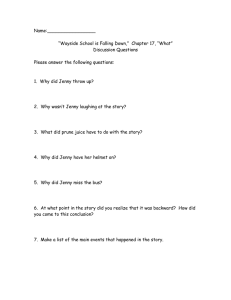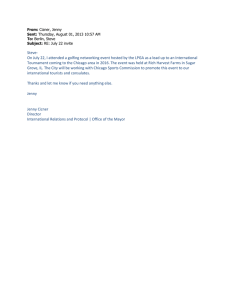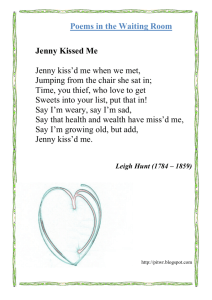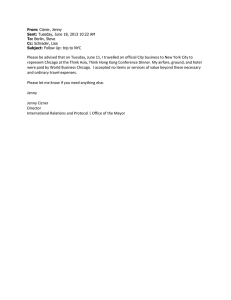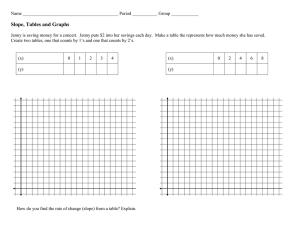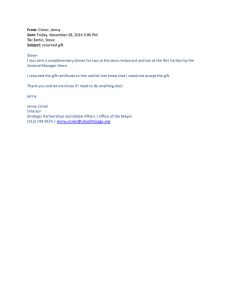Literary Analysis: Erich Segal's First Love
advertisement
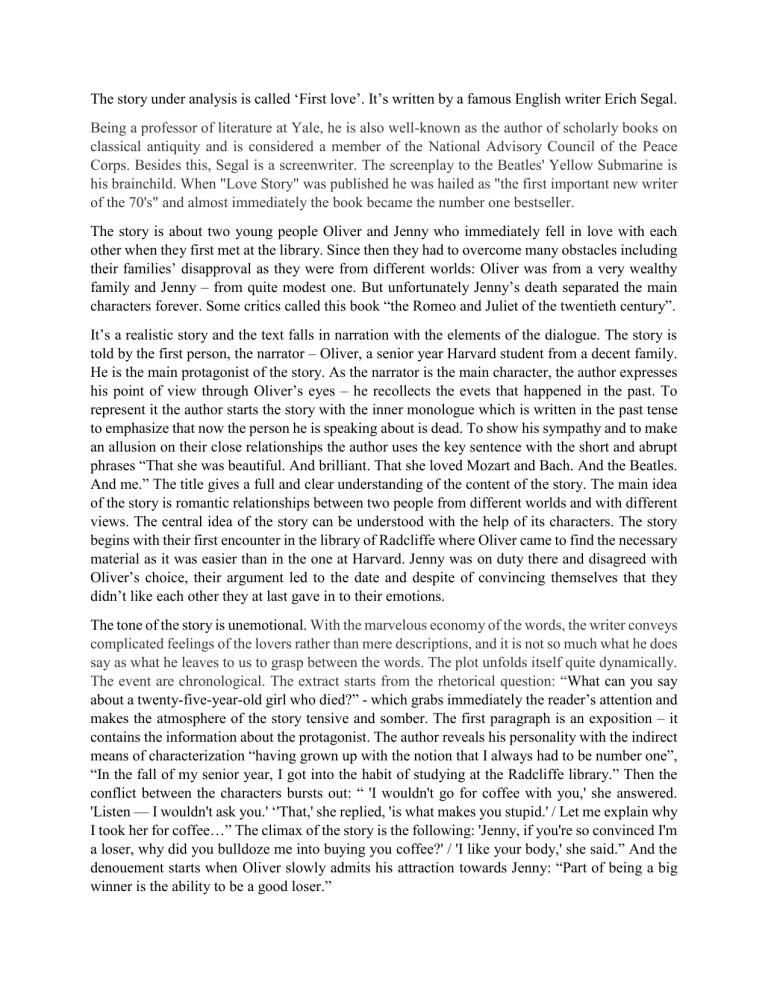
The story under analysis is called ‘First love’. It’s written by a famous English writer Erich Segal. Being a professor of literature at Yale, he is also well-known as the author of scholarly books on classical antiquity and is considered a member of the National Advisory Council of the Peace Corps. Besides this, Segal is a screenwriter. The screenplay to the Beatles' Yellow Submarine is his brainchild. When "Love Story" was published he was hailed as "the first important new writer of the 70's" and almost immediately the book became the number one bestseller. The story is about two young people Oliver and Jenny who immediately fell in love with each other when they first met at the library. Since then they had to overcome many obstacles including their families’ disapproval as they were from different worlds: Oliver was from a very wealthy family and Jenny – from quite modest one. But unfortunately Jenny’s death separated the main characters forever. Some critics called this book “the Romeo and Juliet of the twentieth century”. It’s a realistic story and the text falls in narration with the elements of the dialogue. The story is told by the first person, the narrator – Oliver, a senior year Harvard student from a decent family. He is the main protagonist of the story. As the narrator is the main character, the author expresses his point of view through Oliver’s eyes – he recollects the evets that happened in the past. To represent it the author starts the story with the inner monologue which is written in the past tense to emphasize that now the person he is speaking about is dead. To show his sympathy and to make an allusion on their close relationships the author uses the key sentence with the short and abrupt phrases “That she was beautiful. And brilliant. That she loved Mozart and Bach. And the Beatles. And me.” The title gives a full and clear understanding of the content of the story. The main idea of the story is romantic relationships between two people from different worlds and with different views. The central idea of the story can be understood with the help of its characters. The story begins with their first encounter in the library of Radcliffe where Oliver came to find the necessary material as it was easier than in the one at Harvard. Jenny was on duty there and disagreed with Oliver’s choice, their argument led to the date and despite of convincing themselves that they didn’t like each other they at last gave in to their emotions. The tone of the story is unemotional. With the marvelous economy of the words, the writer conveys complicated feelings of the lovers rather than mere descriptions, and it is not so much what he does say as what he leaves to us to grasp between the words. The plot unfolds itself quite dynamically. The event are chronological. The extract starts from the rhetorical question: “What can you say about a twenty-five-year-old girl who died?” - which grabs immediately the reader’s attention and makes the atmosphere of the story tensive and somber. The first paragraph is an exposition – it contains the information about the protagonist. The author reveals his personality with the indirect means of characterization “having grown up with the notion that I always had to be number one”, “In the fall of my senior year, I got into the habit of studying at the Radcliffe library.” Then the conflict between the characters bursts out: “ 'I wouldn't go for coffee with you,' she answered. 'Listen — I wouldn't ask you.' ‘'That,' she replied, 'is what makes you stupid.' / Let me explain why I took her for coffee…” The climax of the story is the following: 'Jenny, if you're so convinced I'm a loser, why did you bulldoze me into buying you coffee?' / 'I like your body,' she said.” And the denouement starts when Oliver slowly admits his attraction towards Jenny: “Part of being a big winner is the ability to be a good loser.” The characters’ portraits are drawn from within (concerning Oliver) and without (concerning Jenny). As for Oliver the author proves his decent background with the repetition of the words of wealth – he always tries to stress this out and show off “...my entire name was Oliver Barrett. / “I mean, that's most of it”. To underline that his social status and to show his arrogant attitude towards Jenny and simple surroundings at first the author uses irony which passes to sarcasm: ““I got an A minus on the exam, coincidentally the same grade I assigned to Jenny's legs when she first walked from behind that desk”, We went to the Midget Restaurant, a nearby sandwich joint which, despite its name, is not restricted to people of small stature.” Okay, maybe I look rich, but I wouldn't let some 'Cliffie — even one with pretty eyes — call me dumb.” When speaking about Jenny the author uses mainly direct means of characterization as we can see her only with Oliver’s eyes. Through this description we can also trace how Oliver’s opinion changed: at first he compared her with the mouse: “bespectacled mouse type”, “Minnie Four-Eyes", then he uses words with negative connotation and sarcastic remarks to show that she managed to grab his attention and to allude that he isn’t indifferent towards her and probably just hides his feelings: “superior-being type”, “snotty Radcliffe bitch”, ” A minus on the exam, coincidentally the same grade I assigned to Jenny's legs”. The characters seem to be round and well-drawn. The author’s style of writing is simple, and his vocabulary abounds in informal words and interjections to plunge the reader into the story and make it more vivid and true to life. In my mind it is a merit of the story and I liked it very much.
